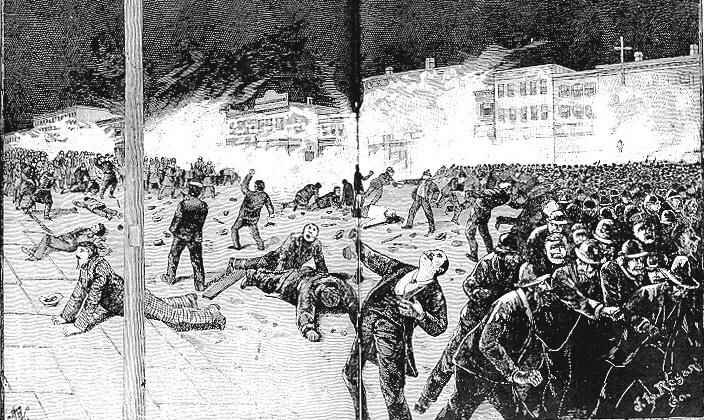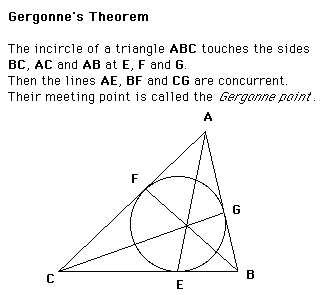^
1493 Pope Alexander VI issues
the bull Inter Caetera II.
It recommends that the people the New World be brought to the faith, to
which they seem well disposed..The subsequent 1494 "Treaty of Tordesillas"
(inspired by Inter Caetera) would divide the New World, everything 370 leagues
(400 km?) west of the Cape Verde islands going to Spain, everything east
to Portugal. A reading of the bull [below] clearly shows that,
contrary to what has been alleged, it in no way sanctions the human rights
violations of which conquistadores became guilty, and against which the
missionary clergy, most notably Bartolomé de
Las Casas, protested vigorously.
Returning
from his first voyage, Columbus landed on the Portuguese coast and was at
once invited to Court. He reached Lisbon March 4, 1493, upon the invitation
of the King of Portugal. On hearing his report, King John II claimed the
newly discovered lands for Portugal by virtue of the Treaty of Alcacovas
of 1479, sanctioned by the Bulls of Pope Sixtus IV, dated 21 June 1481.
The text of the Treaty and the Bull contain some slight variations and thereby
allow of different interpretations. It is difficult to decide, therefore,
whether this claim of the Portuguese King was justified. Contemporary as
well as modern historians have always differed widely in their opinions.
It is generally believed that, with his famous message on his discoveries,
Columbus dispatched to the Spanish Kings, who were at Barcelona, a report
on the difficulties raised by the Portuguese King, but it is questioned
whether this was sent from Lisbon by land or from Palos after having reached
the latter port, 14 March 1493.
King Ferdinand and Queen Isabella of Spain reported the great news at once
to Pope Alexander VI. It is again doubtful whether this was done by a special
messenger or by a courier sent to Cardinal Bernardin de Carvajal and to
Ruiz de Medina, then Spanish ambassadors at the Holy See, and whether this
was done in consequence of the Portuguese claims or according to a general
custom of that period. Pope Alexander VI, himself a Spaniard, granted the
request to confer the lately discovered lands on the Crown of Spain by three
Bulls issued on 03 May and 04 May 1493 (all much in favor of Spain,
and depriving Portugal of nearly all privileges bestowed upon it by the
Bulls of 1452 and 1454, issued bu Nicholas V, and by that of 1481 of Sixtus
IV and one of 1484 of Innocentius VIII). Some months later, on 26 September
1493, a fourth Bull was issued granting to Spain almost unlimited rights.
But this act remained without consequence; for in the meantime, at the suggestion
of the King of Spain, it was agreed that, to avoid complications already
threatening, a conference should be held. Portuguese ambassadors were sent
to Barcelona and, after many negotiations and some interruptions, a settlement
was finally reached at the small Spanish town of Tordesillas and a treaty
was signed on 07 June 1494. Obviously inspired by the corresponding
passage in the second Bull "Inter Caetera", but not referring to this or
any other bulls or treaties, it was provided that there should be drawn
a line running from North to South, 370 leagues west from Cape Verde Islands,
and that everything west of this line should belong to Spain, everything
east of it to Portugal.
The sanction,
which by the terms of the Treaty was to be asked was never given by Alexander
VI and not before 24 January 1506, was a Bull to such effect issued
by Pope Julius II. Although much disputed and very differently interpreted,
this Treaty remained in force until 13 January 1750, when the Treaty
of Madrid annulled the boundary line. It would seem, however, that this
boundary line, first provided for in the second Bull "Inter caetera" and
later corrected in the Treaty of Tordesillas, decided what parts of the
western hemisphere as well as which regions of the eastern hemisphere were
discovered, possessed and civilized by Spain and by Portugal respectively,
and which still speak the language and show the influence of the culture
of their first discoverers.
Like the
bull Eximiae devotionis of 03 May, the bull Inter Caetera
of 04 May is a restatement of part of the bull Inter Caetera
of 03 May. Taken together the two later bulls cover the same ground
as the bull "Inter caetera" of May 3, for which they form a substitute.
The changes introduced into the bull "Inter caetera" of 04 May, are,
however, of great importance, and highly favorable to Spain. Instead of
merely granting to Castile the lands discovered by her envoys, and not under
Christian rule, the revised bull draws a line of demarcation one hundred
leagues west of any of the Azores or Cape Verde Islands, and assigns to
Castile the exclusive right to acquire territorial possessions and to trade
in all lands west of that line, which at Christmas, 1492, were not in the
possession of any Christian prince. The general safeguard to the possible
conflicting rights of Portugal is lacking. All persons are forbidden to
approach the lands west of the line without special license from the rulers
of Castile.
It is not probable that
by this bull Alexander VI intended to secure to Portugal an eastern route
to the Indies, as some writers have maintained. In the bulls of 03 May,
the earlier papal grants to Portugal are said to have given her rights in
the region of Guinea and the Gold Mine, but the Indies are not mentioned.
The bull of May 4 does not name Portugal and refers to her only in the clause
which excepts from the donation any lands west of the demarcation line,
which at Christmas, 1492, might be in the possession of any Christian prince.
^
The Bull Inter Caetera
(Alexander VI.) 04 May 1493.
Alexander, bishop, servant of the servants of God, to the illustrious sovereigns,
our very dear son in Christ, Ferdinand, king, and our very dear daughter
in Christ, Isabella, queen of Castile, Leon, Aragon, Sicily, and Granada,
health and apostolic benediction.
Among other works well pleasing to the Divine Majesty and
cherished of our heart, this assuredly ranks highest, that in our times
especially the Catholic faith and the Christian religion be exalted and
be everywhere increased and spread, that the health of souls be cared for
and that barbarous nations be overthrown and brought to the faith itself.
Wherefore inasmuch as by the favor of divine clemency, we, though of insufficient
merits, have been called to this Holy See of Peter, recognizing that as
true Catholic kings and princes, such as we have known you always to be,
and as your illustrious deeds already known to almost the whole world declare,
you not only eagerly desire but with every effort, zeal, and diligence,
without regard to hardships, expenses, dangers, with the shedding even of
your blood, are laboring to that end; recognizing also that you have long
since dedicated to this purpose your whole soul and all your endeavors —
as witnessed in these times with so much glory to the Divine Name in your
recovery of the kingdom of Granada from the yoke of the Saracens —
we therefore are rightly led, and hold it as our duty, to grant you even
of our own accord and in your favor those things whereby with effort each
day more hearty you may be enabled for the honor of God himself and the
spread of the Christian rule to carry forward your holy and praiseworthy
purpose so pleasing to immortal God.
We have indeed learned that you, who for a long time had intended to seek
out and discover certain islands and mainlands remote and unknown and not
hitherto discovered by others, to the end that you might bring to the worship
of our Redeemer and the profession of the Catholic faith their residents
and inhabitants, having been up to the present time greatly engaged in the
siege and recovery of the kingdom itself of Granada were unable to accomplish
this holy and praiseworthy purpose; but the said kingdom having at length
been regained, as was pleasing to the Lord, you, with the wish to fulfill
your desire, chose our beloved son, Christopher Columbus, a man assuredly
worthy and of the highest recommendations and fitted for so great an undertaking,
whom you furnished with ships and men equipped for like designs, not without
the greatest hardships, dangers, and expenses, to make diligent quest for
these remote and unknown mainlands and islands through the sea, where hitherto
no one had sailed; and they at length, with divine aid and with the utmost
diligence sailing in the ocean sea, discovered certain very remote islands
and even mainlands that hitherto had not been discovered by others; wherein
dwell very many peoples living in peace, and, as reported, going unclothed,
and not eating flesh.
Moreover, as
your aforesaid envoys are of opinion, these very peoples living in the said
islands and countries believe in one God, the Creator in heaven, and seem
sufficiently disposed to embrace the Catholic faith and be trained in good
morals. And it is hoped that, were they instructed, the name of the Savior,
our Lord Jesus Christ, would easily be introduced into the said countries
and islands.
Also, on one of the chief
of these aforesaid islands the said Christopher has already caused to be
put together and built a fortress fairly equipped, wherein he has stationed
as garrison certain Christians, companions of his, who are to make search
for other remote and unknown islands and mainlands. In the islands and countries
already discovered are found gold, spices, and very many other precious
things of divers kinds and qualities.
Wherefore, as becomes Catholic kings and princes, after earnest consideration
of all matters, especially of the rise and spread of the Catholic faith,
as was the fashion of your ancestors, kings of renowned memory, you have
purposed with the favor of divine clemency to bring under your sway the
said mainlands and islands with their residents and inhabitants and to bring
them to the Catholic faith.
Hence,
heartily commending in the Lord this your holy and praiseworthy purpose,
and desirous that it be duly accomplished, and that the name of our Savior
be carried into those regions, we exhort you very earnestly in the Lord
and by your reception of holy baptism, whereby you are bound to our apostolic
commands, and by the bowels of the mercy of our Lord Jesus Christ, enjoy
strictly, that inasmuch as with eager zeal for the true faith you design
to equip and despatch this expedition, you purpose also, as is your duty,
to lead the peoples dwelling in those islands and countries to embrace the
Christian religion; nor at any time let dangers or hardships deter you there
from, with the stout hope and trust in your hearts that Almighty God will
further your undertakings.
And, in
order that you may enter upon so great an undertaking with greater readiness
and heartiness endowed with benefit of our apostolic favor, we, of our own
accord, not at your instance nor the request of anyone else in your regard,
but out of our own sole largess and certain knowledge and out of the fullness
of our apostolic power, by the authority of Almighty God conferred upon
us in blessed Peter and of the vicarship of Jesus Christ, which we hold
on earth, do by tenor of these presents, should any of said islands have
been found by your envoys and captains, give, grant, and assign to you and
your heirs and successors, kings of Castile and Leon, forever, together
with all their dominions, cities, camps, places, and villages, and all rights,
jurisdictions, and appurtenances, all islands and mainlands found and to
be found, discovered and to be discovered towards the west and south, by
drawing and establishing a line from the Arctic pole, namely the north,
to the Antarctic pole, namely the south, no matter whether the said mainlands
and islands are found and to be found in the direction of India or towards
any other quarter, the said line to be distant one hundred leagues towards
the west and south from any of the islands commonly known as the Azores
and Cape Verde.
With this proviso however
that none of the islands and mainlands, found and to be found, discovered
and to be discovered, beyond that said line towards the west and south,
be in the actual possession of any Christian king or prince up to the birthday
of our Lord Jesus Christ just past from which the present year one thousand
four hundred ninety-three begins.
And
we make, appoint, and depute you and your said heirs and successors lords
of them with full and free power, authority, and jurisdiction of every kind;
with this proviso however, that by this our gift, grant, and assignment
no right acquired by any Christian prince, who may be in actual possesssion
of said islands and mainlands prior to the said birthday of our Lord Jesus
Christ, is hereby to be understood to be withdrawn or taking away.
Moreover we command you in virtue of holy
obedience that, employing all due diligence in the premises, as you also
promise — nor do we doubt your compliance therein in accordance with
your loyalty and royal greatness of spirit — you should appoint to
the aforesaid mainlands and islands worthy, God-fearing, learned, skilled,
and experienced men, in order to instruct the aforesaid inhabitants and
residents in the Catholic faith and train them in good morals.
Furthermore, under penalty of excommunication late sententie to be incurred
ipso facto, should anyone thus contravene, we strictly forbid all persons
of whatsoever rank, even imperial and royal, or of whatsoever estate, degree,
order, or condition, to dare without your special permit or that of your
aforesaid heirs and successors, to go for the purpose of trade or any other
reason to the islands or mainlands, found and to be found, discovered and
to be discovered, towards the west and south, by drawing and establishing
a line from the Arctic pole to the Antarctic pole, no matter whether the
mainlands and islands, found and to be found, lie in the direction of India
or toward any other quarter whatsoever, the said line to be distant one
hundred leagues towards the west and south, as is aforesaid, from any of
the islands commonly known as the Azores and Cape Verde; apostolic constitutions
and ordinances and other decrees whatsoever to the contrary notwithstanding.
We trust in Him from whom empires
and governments and all good things proceed, that, should you, with the
Lord's guidance, pursue this holy and praiseworthy undertaking, in a short
while your hardships and endeavors will attain the most felicitious result,
to the happiness and glory of all Christendom.
But inasmuch as it would be difficult to have these present letters sent
to all places where desirable, we wish, and with similar accord and knowledge
do decree, that copies of them, signed by the hand of a public notary commissioned
therefor, and sealed with the seal of any ecclesiastical officer or ecclesiastical
court, the same respect is to be shown in court and outside as well as anywhere
else as would be given to these presents should they thus be exhibited or
shown. Let no one, therefore, infringe, or with rash boldness contravene,
this our recommendation, exhortation, requisition, gift, grant, assignment,
constitution, deputation, decree, mandate, prohibition, and will. Should
anyone presume to attempt this, be it known to him that he will incur the
wrath of Almighty God and of the blessed apostles Peter and Paul.
Given at Rome, at St. Peter's, in the year
of the incarnation of our Lord one thousand four hundred and ninety-three,
the fourth of May, and the first year of our pontificate.
Gratis by order of our holy lord, the pope.
June. For the referendary, For J. Bufolinus.
A. de Mucciarellis. A. Santoseverino. L. Podocatharus.
The
above bull in no way sanctions atrocities such as described in this excerpt
from Bartolome de Las Casas's The Devastation of the Indies:
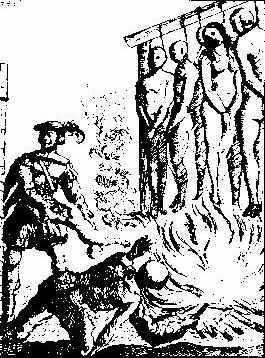 ...And the Christians, with their horses and swords and pikes began to carry
out massacres and strange cruelties against them. They attacked the towns
and spared neither the children nor the aged nor pregnant women nor women
in childbed, not only stabbing them and dismembering them with but cutting
them to pieces as if dealing with sheep in the slaughterhouse. They laid
bets as to who, with one stroke of the sword, could split a man in two or
could cut off his head or spill out his entrails with a single stroke of
the pike.
...And the Christians, with their horses and swords and pikes began to carry
out massacres and strange cruelties against them. They attacked the towns
and spared neither the children nor the aged nor pregnant women nor women
in childbed, not only stabbing them and dismembering them with but cutting
them to pieces as if dealing with sheep in the slaughterhouse. They laid
bets as to who, with one stroke of the sword, could split a man in two or
could cut off his head or spill out his entrails with a single stroke of
the pike.
They took infants from their
mothers' breasts, snatching them by the legs and pitching them headfirst
against the crags or snatched them by the arms and threw them into the rivers,
roaring with laughter and saying bas the babies fell into the water, "Boil
there, you offspring of the devil!" Other infants they put to the sword
along with their mothers and anyone else who happened to be nearby.
They made some low wide gallows on which
the hanged victim's feet almost touched the ground, stringing up their victims
in lots of thirteen, in memory of Our Redeemer and His twelve apostles,
then set burning wood at their feet and thus burned them alive. To others
they attached straw or wrapped their whole bodies in straw and set them
afire. With still others, all those they wanted to capture alive, they cut
off their hands and hung them round the victim's neck, saying, "Go now,
carry the message," meaning, Take the news to the Indians who have fled
to the mountains. They usually dealt with the chieftains and nobles in the
following way: they made a grid of rods which they placed on forked sticks,
then lashed the victims to the grid and lighted a smoldering fire underneath,
so that little by little, as those captives screamed in despair and torment,
their souls would leave them.
I once
saw this, when there were four or five nobles lashed on grids and burning;
I seem even to recall that there were two or three pairs of grids where
others were burning, and because they uttered such loud screams that they
disturbed the captain's sleep, he ordered them to be strangled. And the
constable, who was worse than an executioner, did not want to obey that
order (and I know the name of that constable and know his relatives in Seville),
but instead put a stick over the victims' tongues, so they could not make
a sound, and he stirred up the fire, but not too much, so that they roasted
slowly, as he liked.
I saw all these
things I have described, and countless others. And because all the people
who could do so fled to the mountains to escape these inhuman, ruthless,
and ferocious acts, the Spanish captains, enemies of the human race, pursued
them with the fierce dogs they kept which attacked the Indians, tearing
them to pieces and devouring them. And because on few and far between occasions,
the Indians justifiably killed some Christians, the Spaniards made a rule
among themselves that for every Christian slain by the Indians, they would
slay a hundred Indians. |
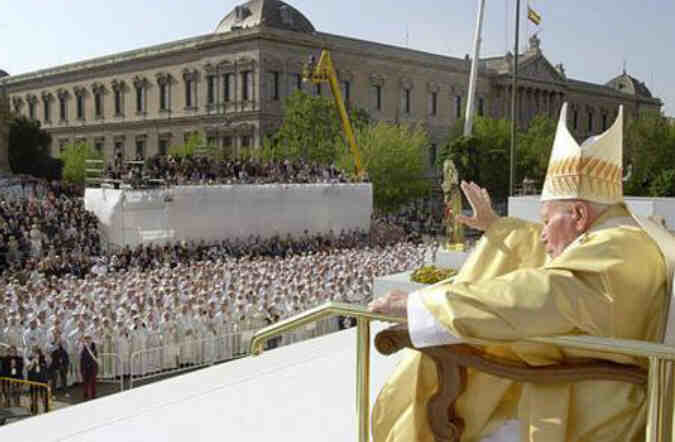 On
a May 04:
On
a May 04: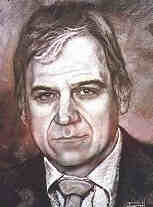 2001
James A. Trafficant, during his 9th term as US Congressman (D — Ohio
17th district, Youngstown), is indicted for taking bribes. He had similar
legal troubles before, including before he was elected to Congress, when
he was a sheriff (and was acquitted that time). [image >]
2001
James A. Trafficant, during his 9th term as US Congressman (D — Ohio
17th district, Youngstown), is indicted for taking bribes. He had similar
legal troubles before, including before he was elected to Congress, when
he was a sheriff (and was acquitted that time). [image >]
 ...And the Christians, with their horses and swords and pikes began to carry
out massacres and strange cruelties against them. They attacked the towns
and spared neither the children nor the aged nor pregnant women nor women
in childbed, not only stabbing them and dismembering them with but cutting
them to pieces as if dealing with sheep in the slaughterhouse. They laid
bets as to who, with one stroke of the sword, could split a man in two or
could cut off his head or spill out his entrails with a single stroke of
the pike.
...And the Christians, with their horses and swords and pikes began to carry
out massacres and strange cruelties against them. They attacked the towns
and spared neither the children nor the aged nor pregnant women nor women
in childbed, not only stabbing them and dismembering them with but cutting
them to pieces as if dealing with sheep in the slaughterhouse. They laid
bets as to who, with one stroke of the sword, could split a man in two or
could cut off his head or spill out his entrails with a single stroke of
the pike. 1980
1980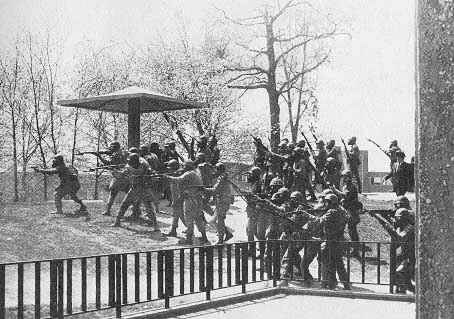 1970
1970
